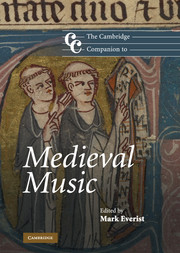1 - Plainsong
from Part I - Repertory, styles and techniques
Published online by Cambridge University Press: 28 September 2011
Summary
After the introduction of public Christian worship services in the fourth and fifth centuries, chant genres of varying styles developed gradually as the parts of the services sung by the congregation became distinguished from those performed by a soloist and choir. Already in the fourth century, responsorial psalmody, performed by a soloist with congregational responses, followed the readings in the first part of the mass. Descriptions of Western liturgical practice in the fourth and fifth centuries suggest an emerging repertory of chant along the lines of the full annual cycle that was established in the Jerusalem liturgy by the middle of the fifth century. Patristic writings such as the sermons of Saint Augustine and Pope Leo I refer to commentary by the celebrant at mass on a psalm verse just performed, but at first the liturgical assignments of these verses were not entirely fixed. The emphasis of early writers on the psalms in the liturgy is part of a broader intellectual movement in late antiquity that made the Book of Psalms central to Christian liturgy and exegesis; as early as Augustine and Cassiodorus, commentary traditions present the psalms as prophetic texts, and allegorical readings of the psalms profoundly shaped the choice of those psalm verses that were used as chant texts.
The principal scriptural influence on the shape of the annual liturgical Cycle was the gospel reading at mass. The Roman cycle of gospel readings for the Sundays and principal feast days of the liturgical year was established by the end of the sixth century. The gospel reading reflected the event commemorated on that day or occupied a place in a series that emerged from the continuous reading of the gospels over the course of the year. The theme of the gospel often shaped the texts of the liturgy for the day as a whole.
- Type
- Chapter
- Information
- The Cambridge Companion to Medieval Music , pp. 7 - 25Publisher: Cambridge University PressPrint publication year: 2011



